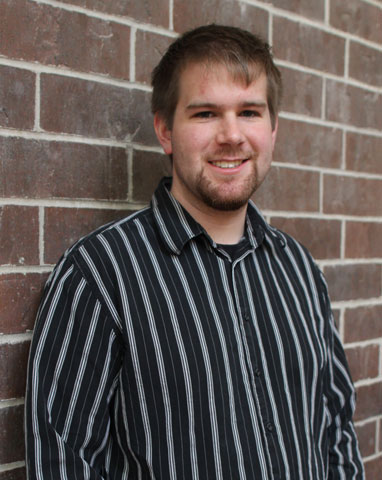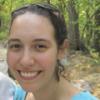
Peter Anthony Effertz (NCR photo/Eloísa Pérez-Lozano)
Peter Anthony Effertz had a profound religious experience at age 14 during a convention for Lutheran youth in Orlando, Fla. He felt on fire for God. It was also the time he realized he was gay. "It was the first time I even recognized [I had] feelings for guys," Effertz said. "I remember promising God that I was going to change and get rid of these feelings."
Christine Louise Peterson, aka "Petey Peterson," was a cradle Catholic who took pride in being more conservative than her parents. But during her junior year, when she realized she had feelings for women, she knew she had to leave the Catholic church.
Brian Vanderheyden was raised Catholic in Green Bay, Wis., but currently identifies as agnostic or atheist, something he believes is more pejorative to some than identifying as gay. He has not returned to the Catholic church.
Effertz, Peterson and Vanderheyden have taken a path all too familiar for lesbian, gay, bisexual and transgender young people: In the midst of their spiritual and identity development, they felt compelled to choose between their church and their sexuality.
Michael LaSala, a clinical social worker and psychotherapist who works with LGBT individuals and their families, said he believes that "in general a person's comfort with his or her homosexuality is inversely related to religious involvement if the person is involved in a religion that is openly and publicly oppressive toward gay and lesbian people."
Loretto Sr. Jeannine Gramick, a pioneer in Catholic ministry to the gay community, said she believes much depends on the connections LGBT youth can make. "If they are in touch with a very sympathetic figure who, to them, represents the institutional church ... a priest or a nun or a minister and they get understanding, they would be less inclined to leave the institutional church."
"If they find no support at all, which unfortunately is the case too often, then they will leave their Catholic identity behind," she said.
"It was either my faith or this [LGBT identity] and I chose that," Peterson said. "I felt that as someone who identified as gay, I should not participate in a faith organization that believes that is a sin. I am someone who believes that when you commit to something, you commit to it wholeheartedly and since I was gay, I felt that I could not honestly, fairly commit to the Catholic faith."
Effertz felt he was losing his faith by the end of high school. "I was almost getting mad at God and thinking: 'Why aren't you changing me?' " During his sophomore year in high school, he went out with a girl, but remembers feeling confused. "I didn't want to think about it even though deep down, I knew [I was gay]," he said.
Vanderheyden knew very early on who he was, but he was closeted until his early 20s. The conflict of his gay and Catholic identities was the initial reason for further exploring his Catholic faith, but he privately moved away from his Catholic identity after high school and hasn't gone back.
Effertz was raised Lutheran in a church with 2,100 members in Janesville, Minn. He attended parochial school and while he was taught to be tolerant in his views, Effertz said that the subject of sexuality was not really dealt with very much. After his experience in Orlando, he gave God two weeks to rid him of his attraction to guys. Time passed but the feelings remained.
Effertz played the trumpet, sang in the choir, and went to church twice a week. He didn't like sports, but he played football his junior and senior years in high school and hung out with guy friends watching basketball. "I wanted to be straight and continue to be friends with them because I felt a distance," Effertz remembered.
At home, his family did not talk directly about homosexuality, but Effertz felt there was an underlying negative tone. When he approached his home pastor about his feelings, the pastor cried, but said he still loved Effertz.
When Effertz started at Iowa State University in Ames, he set a new goal for himself: to get a girlfriend. He began going to a Lutheran church in town. However, after meeting a girl during freshman year and subsequently figuring out he was not attracted to girls, Effertz still refused to think about being gay. He told himself he was Christian and he was straight, though he knew otherwise.
Peterson's parents raised her in the Catholic faith and she attended a Catholic high school in Iowa City where her father worked as a guidance counselor. She enjoyed going to church and participating in school activities and even was involved as an altar girl, eucharistic minister and liturgical reader through adolescence.
Looking back, Peterson was more conservative than her parents, whom she considered liberal or "cafeteria" Catholics. Both were openly pro-choice and had many friends who identified as LGBT.
"I remember I would eat dinner at the house of one of my best friends and her mom would give me pamphlets to give to my parents about being pro-life," Peterson said. "I would joke about adhering more to the Catholic faith than they did."
Peterson described her Catholic upbringing as typical for a white, middle-class family. She said she felt comfortable in her Catholic identity until she began to have questions regarding her faith and her attraction to women.
"I knew I had certain feelings, attractions towards women probably in sixth, seventh, eighth grade, but I didn't realize I wasn't straight until the winter of my junior year," Peterson said.
Vanderheyden, unlike the rest of his family, didn't like going to church. He was an altar boy just so he could say that he was participating.
"I basically just went to church because it was what my family wanted and not necessarily what I wanted," he said. "I actually felt pretty uncomfortable in church, more related to the gay identity."
In that regard, Vanderheyden grew up in a somewhat hostile environment. He lived in a typical white, upper-middle-class, Catholic/Christian suburb in Green Bay, where there was not much exposure to gay people. His family would say negative things and make jokes about gay people, which motivated him to not bring too much attention to himself.
"I was afraid of people finding out about me being gay and not wanting to identify with a Catholic or Christian identity," he said.
Effertz, as he began to accept his feelings during his junior year, began coming out to select friends and eventually stopped going to church. His gay identity "was such a big question and I didn't know how it was going to fit into my faith yet," Effertz said.
He was very nervous about coming out to his parents. In the end, his father assured him he was still his son and he loved him no matter what, something Effertz believes made their relationship even stronger. His stepmother was also very supportive and told him, "I love you for everything that you are."
Although he still believes there are some very good tenets in the Lutheran faith, Effertz no longer feels comfortable attending Lutheran church services. "I was afraid that they might find out and might confront me about it," he recalled.
Initially, Peterson came out as a lesbian and she remembers feeling terrified about what it would mean to her friends and her parents. It was going to be a big change.
"Things were going to change once I said this out loud," Peterson said. "I realized how comfortable and naive I had been in this space and everything is going to be different."
Once she did come out, in the words of Peterson's mother, "she came out running," embracing it completely. At the same time, Peterson said there were other doubts she was facing regarding her faith. Given those doubts and as she began to embrace her LGBT identity, she unconsciously felt she had to make a choice between being Catholic and being an active member of the LGBT community.
"Everyone was really supportive for the most part, at least to my face, and my good friends are still my friends," Peterson said. Regardless, Peterson said she still felt the need to leave her Catholic faith at home after high school graduation.
Though Vanderheyden moved away from his Catholic identity privately at the end of high school, it took him a while to come out to his family. He envisioned all the possible consequences of coming out for years before actually going through with it.
Although his parents did not know how to react at first, it went better than he had anticipated. Though they are supportive of their son, Vanderheyden said he feels they both still struggle with it deep down.
"I have to recognize that it takes time," he said. He said he knows it will be hard for them to unlearn the negative things it took years to learn. "It's a process for them. They can't just undo that in a day. It just takes time."
Though the conflict between his gay identity and his Catholic identity was the initial starting point of his journey away from religion, he later confronted other problems he had with Catholicism. This ultimately led him to reject organized religion all together.
"I thought that maybe this really doesn't make sense for me," Vanderheyden said. "After a long time, it was just something I couldn't fit."
LaSala said, "I think people who are spiritually inclined will stay with or find religious traditions that are either accepting of their sexual orientations or gender identities -- or will find a way to reconcile their spiritual beliefs and practices with their current traditions."
Still others, he says, may prefer to maintain their own spiritual beliefs and practices outside of organized religions.
Gramick said that having "a support group of allies and others who are of their identity" is important to keeping LGBT people in the church.
In the summer of 2011, Effertz decided to go church-shopping. "I wanted to find a Christian church that I could marry my future love in," he said. Eventually, he found a church in Ames that is open and affirming to the LGBT community and will perform same-sex marriages. After his life journey, Effertz said, "God made me who I am and wants me to be this."
Peterson is still trying to figure out her religious identity.
"I chose really not to deal with it. My Catholic faith, my identity, I just left it there," Peterson remarked. "I felt that the Catholic faith had many good intentions but it was still very flawed. I felt the churches I had belonged to cared more about money, public perception and persecuting others instead of focusing on community, love and forgiveness."
She does, however, credit the Catholic faith for her appreciation of certain values, such as mission and service, that she still holds dear though she does not see them necessarily through the Catholic lens.
Vanderheyden knows people who have made peace with their gay and religious identities and returned to the church, but he hasn't been able to do that. "I couldn't make the leap of faith back into it at all," he said.
[Eloísa Pérez-Lozano is an NCR Bertelsen intern. Her email address is eloisapl@ncronline.org.]


